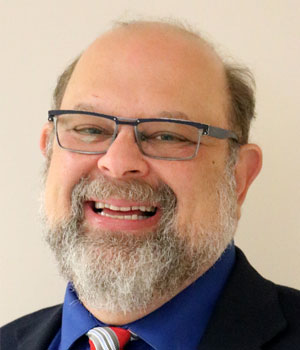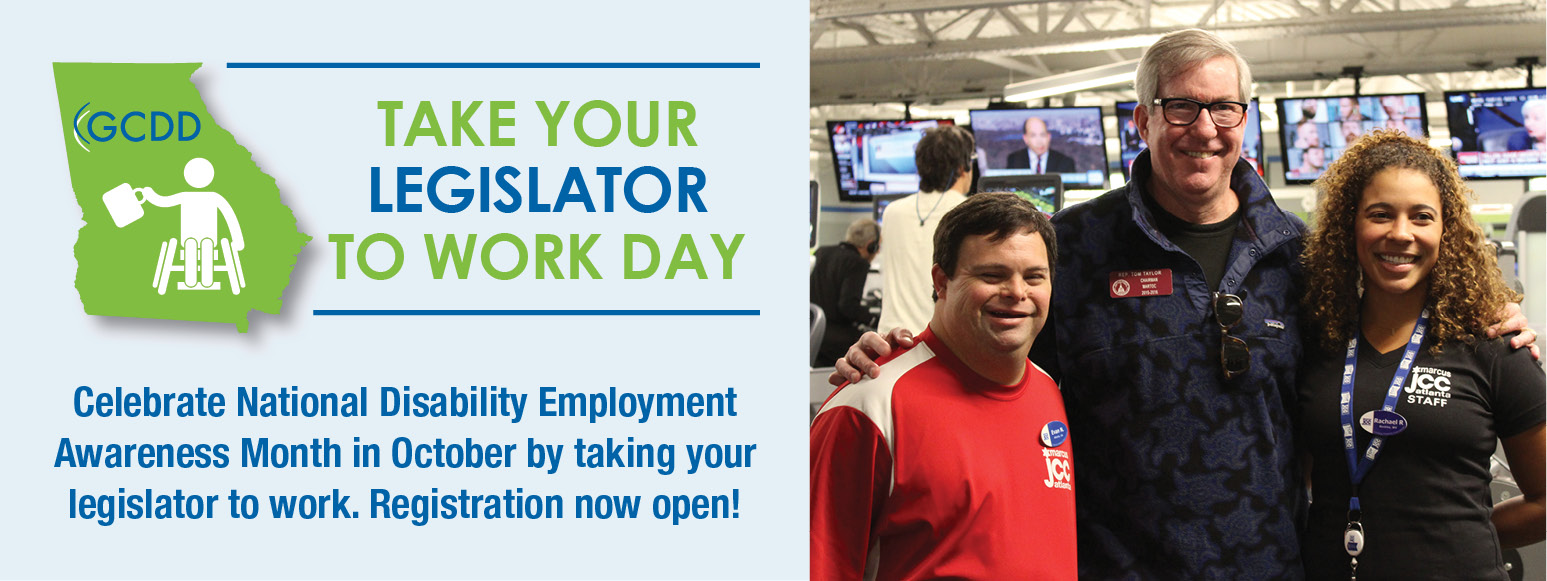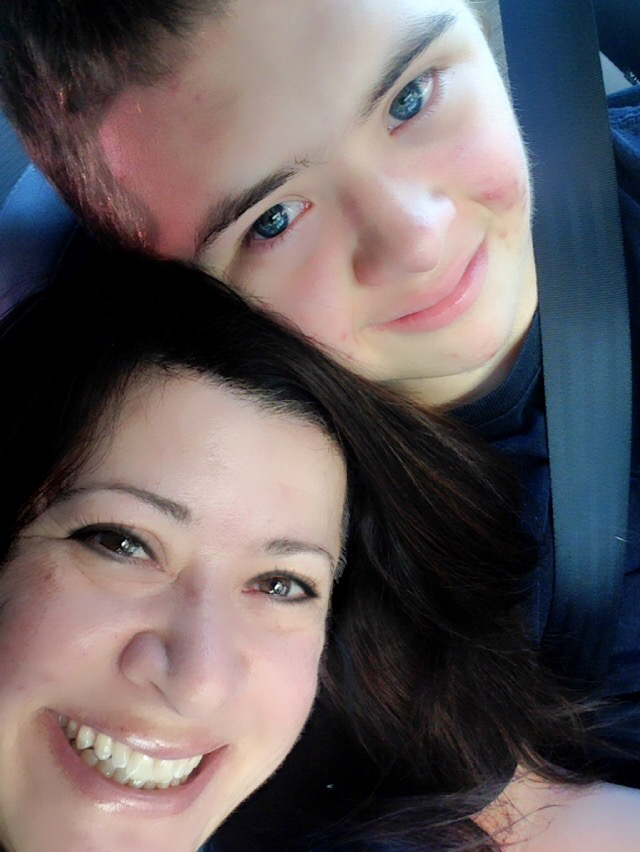
A Digital Newsletter from the Georgia Council on Developmental Disabilities • September 5, 2017
In This Issue:
- A Message from the Executive Director
- Public Policy for the People
- Take Your Legislator to Work Day is Back!
- Council Member Spotlight: Viviana Fernandez
- Entrepreneurs with Disabilities Gather to SOAR at Self-Employment Seminars
A Message from the Executive Director
 I have struggled writing this piece since the events of Charlottesville, Virginia. The rise of neo Nazis and white supremacists should have little to do with the work of the Georgia Council on Developmental Disabilities (GCDD). However, it has a lot to do with who I am and the values that I have always brought to the work that we do here. Learning early in life that members of my family perished in Nazi Germany’s Auschwitz and Buchenwald concentration camps built the foundation for me to fight hatred whenever possible. I learned later that not only had Jews died in concentration camps, but also people with disabilities, gays and lesbians and others considered “undesirables.” Guess we have been thrown in the same mix once again.
I have struggled writing this piece since the events of Charlottesville, Virginia. The rise of neo Nazis and white supremacists should have little to do with the work of the Georgia Council on Developmental Disabilities (GCDD). However, it has a lot to do with who I am and the values that I have always brought to the work that we do here. Learning early in life that members of my family perished in Nazi Germany’s Auschwitz and Buchenwald concentration camps built the foundation for me to fight hatred whenever possible. I learned later that not only had Jews died in concentration camps, but also people with disabilities, gays and lesbians and others considered “undesirables.” Guess we have been thrown in the same mix once again.
When I first started to write this column, it was to celebrate the role of the disability community in defeating efforts to repeal and replace the Affordable Care Act (ACA) and decimate Medicaid. Many will agree that without efforts from ADAPT and other organized efforts like those in Georgia, terrible things might have happened. As I have said to many: “You can’t cut billions from Medicaid and not have it hurt people with disabilities.” At some point, the states will have less money and must decide to cut services, increase waiting lists, and/or return to placing people in institutions or nursing homes. None of those options are good for people with disabilities. Thanks to a broad coalition of individuals, families and allies we got our point across. While US Senators Johnny Isakson and David Perdue voted for the Republican proposal, they know where the disability community stands.
The hardest part of my struggle on both issues is that I have spoken with people over the past few months who I thought would have been our allies. But some were Jews supporting Nazis marching in Virginia or some were families of people with disabilities willing to see huge cuts to Medicaid and the repeal of the ACA. I have even heard that we should fight for people with disabilities to have healthcare, but not “those other people” – which is usually code for poor working minority or immigrants. At first I was stunned. How could it be? Aren’t we all on the same page? Is this the most divisive time ever?
I still don’t have the answer to these questions. For some it may be a belief that the current system is so broken that trying something else might be the solution.
To me, taking healthcare and long-term care services and supports away from people is the exact opposite of everything that I hold to be important and everything that GCDD has been working for the last 25 years. We believe that all people have value and should have access to the necessary supports to live interdependent, economically self-sufficient, included and integrated, and self-determined lives. That is the America I was raised to love and that is the America I raised my children to love.
We hope you enjoy this e-newsletter, and share your thoughts, story ideas and calendar submissions with us at .
Eric E. Jacobson, Executive Director, GCDD
Public Policy for the People
by GCDD Public Policy Director Dawn Alford
Public Policy for the People provides public policy updates as it pertains to people with disabilities here in Georgia.
This summer, there was a huge focus on federal healthcare issues, especially the fight to protect Medicaid and to save the Affordable Care Act (ACA). Continue reading to learn what happened with the healthcare law and what might lay ahead:
The US House of Representatives passed the American Health Care Act (AHCA) on May 4, 2017. This bill contained massive Medicaid cuts, to the tune of over $800 billion. In June and July, the US Senate proposed various healthcare bills also containing devastating cuts to Medicaid; but struggled to find a version of a bill that could get the required 51 votes to pass. Eventually, the US Senate failed to pass a “Skinny Repeal,” with three Republican senators breaking rank and voting “NO” on the bill. Had it passed, the “Skinny Repeal” would have enabled the US House and Senate to enter Conference Committee to work out their differences and implement some version of cuts to Medicaid. Thankfully, this didn’t happen and Congress entered the August recess without passing a healthcare bill.
During August, Georgia Reps. Buddy Carter (District 1), David Scott (District 13) and Doug Collins (District 9), as well as Senator Johnny Isakson engaged with constituents at town hall meetings during the recess. GCDD attended Senator Isakson’s town hall and was happily afforded the opportunity to ask a question. Specifically, in Senator Isakson’s previous telephone town hall, he pledged to never knowingly vote to cut funding that supports individuals with developmental disabilities. However, he voted in favor of the healthcare bills in the Senate that would have led to massive Medicaid cuts. To see Senator Isakson’s full answer, please go here for the first half, and here for the second half. However, important to note, at this in person town hall meeting at Kennesaw State University, he did NOT commit to opposing Medicaid cuts. To watch the entire town hall, click here.
As Congress returns from recess, GCDD will continue to be vigilant in keeping a watch on discussions around healthcare and Medicaid. The debate over healthcare in our country is far from over. In addition to a healthcare bill, Congress has a few ways they might cut Medicaid, such as in a federal Fiscal Year 2018 budget resolution. Other vehicles for Medicaid cuts could come through tax legislation, in a market stabilization package or in the re-authorization for Children's Health Insurance Program (CHIP). CHIP is the federal government’s health insurance program for uninsured children under age 19 who qualify. In Georgia, it is called PeachCare for Kids and covers over 200,000 children.
Also still active is the US Senate’s Graham-Cassidy healthcare proposal that contains harmful provisions that both restructure and cut Medicaid and marketplace financial assistance.
So where does that leave us? What’s next and what should we be doing to ensure Georgians with disabilities are protected from dangerous cuts to Medicaid and healthcare? We must continue to educate Georgia’s US Representatives and Senators as well as Governor Nathan Deal on the importance of Medicaid, home and community based waivers (funded by Medicaid), and healthcare for the disability community. Continue to tell your story of why Medicaid is so important to you.
The Georgia Council on Developmental Disabilities (GCDD) will continue to work hard to make sure you are aware of the issues and know how you can get involved to make a difference.
For more information, visit https://gcdd.org/public-policy-intro.html
Take Your Legislator to Work Day is Back!
The Georgia Council on Developmental Disabilities is excited to announce that Take Your Legislator to Work Day (TYLTWD) is back!
TYLTWD is an opportunity for employees with disabilities to invite their legislator(s) to visit them at work. We believe that visiting an employee at work is the best way to show legislators that people with disabilities want to work and are as capable as anyone at working real, competitive jobs for real wages in integrated settings.
All workers with disabilities working in competitive, integrated employment in their community, at or above minimum wage, are encouraged to apply.
The deadline to register is September 25, 2017.
To register, visit https://gcdd.org/public-policy/take-your-legislator-to-work-day-2017.html (This link is no longer active.)
Council Member Spotlight: Viviana Fernandez

The timing couldn’t have worked out better for Viviana Fernandez when she was recommended to the Georgia Council on Developmental Disabilities (GCDD) as a parent advocate and advisory member.
Fernandez had recently completed 10 years on the board of National Down Syndrome Congress when she received her appointment letter from Governor Nathan Deal in January. Her 15-year-old son, Cameron, is diagnosed with Down syndrome, and after all her years advocating on a national level, joining GCDD has enlightened her to see how important it is to be involved at the local level.
“One of my goals is to be able to reach more of the Hispanic community here in Georgia and get them more involved,” Fernandez explained on utilizing her time on the Council. “I feel like the community is not as involved as it should be when it comes to disability issues. Once you feel like you can make a difference, then you’re more likely to get involved.”
With the Council’s help, Fernandez got a better understanding of vocational rehabilitation (VR) services for her son. While finishing up the ninth grade, her son has already been saying that he wants a job – that he wants to work and be a part of his community. Because of the collaboration with the Council, her son finished job training through a local VR service over the summer.
Even though her son is a purple belt in Taekwondo, plays music with other teens with disabilities on the weekend and has a girlfriend, he is still going through a period where he is trying to figure out what it means to have Down syndrome.
“He’s beginning to see how the world interacts with people with Down syndrome and disabilities and he’s been able to express some thoughts that really touched me – how he understands and views how people view him,” she said.
She believes that although you become a parent advocate once your child is born, their quality of life is benefited by continual advocacy. She has experienced this firsthand when she advocated for her son’s inclusion in his elementary school. After two years of fighting for her son’s right to not be moved to a different school, his classroom became inclusive. She added, “That’s the difference you can make. When you help your child first, you can then help so many others.”
Fernandez worked at CNN Español for 15 years as a journalist while also advocating for people with disabilities. She lives in Johns Creek and started her appointment as an advisory member with GCDD in 2017.
Entrepreneurs with Disabilities Gather to SOAR at Self-Employment Seminar
Many entrepreneurs go into business due to downsizing, familial connections or for financial independence. Understanding how all levels of business work can lead to success in self-employment.
“The businesses that grow and stay are the ones that get technical assistance, support, training, networking and who understand the financial opportunities of business,” said Elizabeth Wilson, executive director of the Georgia Micro Enterprises Network (GMEN), a nonprofit association that supports and funds viable micro-businesses in Georgia.
Wilson was one of many presenters at the SOAR: A Pathway to Self-Employment seminar in August 2017 at the All About Developmental Disabilities (AADD) Family Support Center in Decatur, Georgia.
The seminar was co-hosted by Synergies Work, Inc., a nonprofit that provides people with disabilities the supports to become financially independent as entrepreneurs and the Georgia Microboards Association (GMA), a nonprofit organization that provides technical assistance to people with disabilities and their families.
Vocational Rehabilitation (VR), behavioral health and community service professionals, individuals with disabilities and their families attended the one-day seminar to learn how to successfully be self-employed.
“We are coordinating and collaborating with organizations to see how we can bring in the financial resources for people to take the next jump forward in starting a business,” said Aarti Sahgal, founder of Synergies Work.

Ryan Johnson, executive director of GMA, elaborated on how determining goals can help in deciding where that jump forward will lead. “It’s important that your goals represent what you want. We start at the biggest goal that we can, then we break that down into small manageable pieces that we can do and actually make progress to making those goals a reality,” he said.
Managing benefits is one of those pieces that is vitally important. Sally Atwell and Curtis Rodgers, both of whom work in the Benefits Navigator Work Incentive Planning and Assistance (WIPA) Program at the Shepherd Center in Atlanta, discussed how to make the best financial decisions possible and reach your maximum economic potential while understanding how work can affect Social Security benefits.
The discussion highlighted the importance of how Social Security views income called net earnings through self-employment (NESE) and how that income affects eligibility for benefits. “The most important thing I can tell you about being self-employed is record keeping,” said Rodgers. “The need for accurate accounting when it comes to social security and the IRS is crucial.”
Atwell agreed, “Record keeping, reporting and tax returns – those are the keys if self-employment is your goal.”
Good record keeping and building credit – being money smart – work hand in hand to determine how successful a business can be. Federal Deposit Insurance Corporation (FDIC) Community Affairs Specialist Elaine Hunter explained the value of being credit and money smart personally and in business. Hunter covered topics related to banking, budgeting, credit scores, debt, interest and borrowing wisely.
To give a “real-life” exercise of how to start a business, Wilson broke participants into groups; gave them budgets, timelines and resources; while giving them 15 minutes to come up with a viable business idea.
“Make the best use of your money by prioritizing it,” Hunter explained. “Ask yourself ‘what are the essential things I need?’ ‘What are the higher priorities?’”
While accurate finances are key to building a strong business, so is building a robust network. Ashish Thakur, executive director of the Atlanta CEO Council, a relationship-driven nonprofit dedicated to helping executive leaders build trusted and long-lasting relationships, explained the importance of building a human network.
Thakur stressed the four pillars of that network: family, friends, mentors and prospects. “Those people on that list are going to help you in your business one way or another. Grow that list, but grow it carefully and thoughtfully.” He added that one of the most important things you can do to build connections is to follow up, and that the currency of networking is generosity, not greed.
For more information on Synergies Works, visit www.synergieswork.org
For more information on Money Smart: Financial Education Program, visit www.fdic.gov/moneysmart
For more information on the Benefits Navigator WIPA Program provided by the Shepherd Center, visit www.benefitsnavigator.org
